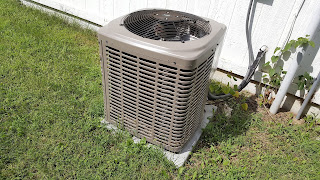Environmental Change and Home Comfort
A lot has changed in the last 20 years. The global temperature has risen six-tenths of a degree and extreme weather in the United States has increased by 30 percent. From 1992 to 2014 there have been more than 6,600 major climate, weather, and water disasters worldwide. Homes were built to withstand the environmental conditions of the time they were constructed. If your home is older, it may not be able to endure the current weather conditions.In addition, your HVAC system is designed to function in a sealed indoor environment. When you use your AC, all of the air in your home will pass through it at some point, which means that your unit has a direct impact on your home’s comfort. The average U.S. citizen spends 90 percent of their time inside, so indoor air quality is important for everyone’s wellbeing.
At the Lake of the Ozarks, the summer months can bring warm humid air. If you have experienced a high heat and poor air quality day this summer, you know how uncomfortable this can be, and how important your indoor air quality is for your overall wellbeing.
Indoor Air Pollutants
With the recent climate changes, indoor air quality is more important now than ever. Pollen is one of the most common indoor air pollutants. With the rising global temperatures comes an earlier appearance of pollen. The warm weather shifted pollen patterns resulting in seasonal allergies being early. This last year, spring allergy sufferers may have noticed the sniffling a good month sooner than expected. Some areas are also experiencing weather changes that have led to conditions that favor the growth of mold and mildew - two other common indoor air pollutants. With the warm, humid air we often experience at the Lake of the Ozarks, mold can become a major problem, as these high humidity levels can lead to mold growth; humidity levels above 60% pose a threat to your indoor air quality. Improper air quality can result in headaches, fatigue, shortness of breath, hypersensitivity, and allergies, sinus congestion, coughing and sneezing, dizziness, and nausea.AC and Indoor Air Quality
People are using their air conditioning units more as temperatures increase during the summer. Mold requires moisture or water to grow. Unfortunately, air conditioning units provide just the right amount of moisture for mold. When the air is cooled, moisture is introduced, which causes humidity. Cooling the air causes moisture in the coils of the AC unit. If you don’t have a good filtration system, dust will build up, and wet dust will turn into mold. It is important to have filters that remove the dust from the air and that you change them regularly. You do not want to be breathing in those pollutants.What Precautions Can You Take to Improve Your Indoor Air Quality?
 Not only is it important for the air inside your home to be a comfortable temperature, but you also want the quality of the air to be good as well. While some things may be out of your control, there are little things you can do around your home to improve the quality of the air that you and your family are breathing in on a daily basis. Here are some tips to improve your indoor air quality from Royal Heating & Air:
Not only is it important for the air inside your home to be a comfortable temperature, but you also want the quality of the air to be good as well. While some things may be out of your control, there are little things you can do around your home to improve the quality of the air that you and your family are breathing in on a daily basis. Here are some tips to improve your indoor air quality from Royal Heating & Air:1. Keep Your Floors Clean.
One of the easiest ways to keep pollutants out of the air in your home is to clean your floors regularly. This will keep chemicals and allergens from settling and accumulating on the floors of your home.
2. Assess the Chemical Use in Your Home.
Consistently using chemicals inside your home is not good for your health. While keeping your home clean is essential to improving your indoor air quality, how you complete that cleaning is also important. Clean with natural cleaning products as much as possible.
3. Improve Your Ventilation Systems.
 Poor ventilation in your home can directly impact indoor air quality. Airflow is crucial for good indoor air quality. You can improve your ventilation system’s efficiency by regularly changing your air filters, cleaning your ducts, and by sealing your home properly.
Poor ventilation in your home can directly impact indoor air quality. Airflow is crucial for good indoor air quality. You can improve your ventilation system’s efficiency by regularly changing your air filters, cleaning your ducts, and by sealing your home properly.4. Reduce the Humidity in Your Home.
Dust mites and mold, both contributors to poor air quality, love moisture. Controlling the humidity levels in your home is another way to improve your indoor air quality. Consider investing in a humidifier or dehumidifier, depending on your home’s moisture levels.
5. Keep Your AC Clean.
Keeping your HVAC unit clean is another great way to improve your indoor air quality, and you're giving your system a longer life in the process. Changing the air filter on your HVAC system monthly is one of the easiest things you can do to keep your system clean and running efficiently.
Improve Your Indoor Air Quality with Royal Heating & Air
Royal Heating & Air - "The King of Comfort"





No comments:
Post a Comment